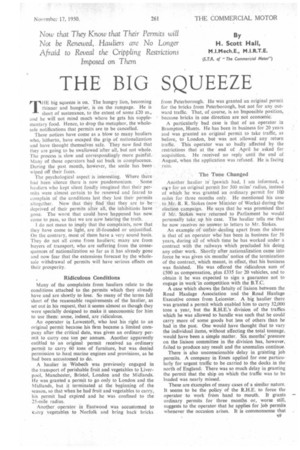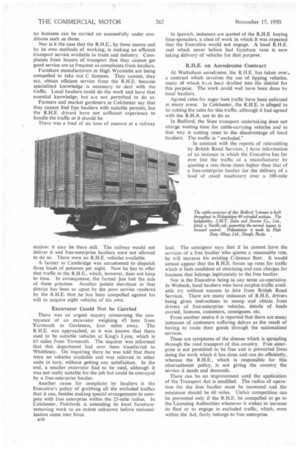THE BIG SQUEEZE
Page 43

Page 44

If you've noticed an error in this article please click here to report it so we can fix it.
THE big squeeze is on. The hungry lion, becoming thinner and hungrier, is on the rampage. He is short of sustenance, to the extent of some 1.20 m., and he will not mind much where he gets his supplementary food. Hence, to drop the metaphor, the wholesale notifications that permits are to be cancelled.
These notices have come as a blow to many hauliers who; hitherto, have escaped the grip of nationalization and have thought themselves safe. They now find that they are going to be swallowed after all, but not whole. The process is slow and correspondingly more painful.. Many of those operators had sat back in complacence. During the past month, however, the smile has been
wiped off their faces. , .
The psychological aspect is interesting. Where there had been silence there is now pandemonium. Some hauliers who kept silent fondly imagined that their permits were almost certain to be renewed and feared to complain of the conditions lest they lost their permits altogether. Now that they find that they arc to be deprived of their permits after all, the inhibitions have gone. The worst that could have happened has now, come to pass, so that we are now hearing the truth.
I do not mean to imply that the complaints, now that they have come to light, are ill-founded or unjustified. On the contrary, most of them have a very sound basis. They do not all come from hauliers; many are from buyers of transport, who are suffering from the consequences of nationalization so far as it has already gone and now fear that the extensions forecast by the wholesale withdrawal of permits will have serious effects on their prosperity.
Ridiculous Conditions
Many of the complaints from hauliers relate to the conditions attached to the permits which they already have and are shortly to lose. So many of the terms fall short of the reasonable requirements of the haulier, as set out in his request, that it seems almost as though they were specially designed to make it uneconomic for him to use them: some, indeed, are ridiculous.
An operator in Lowestoft, who lost his right to an original permit because his firm became a limited company after the critical date, was given an ordinary permit to carry one ton per annum. Another apparently entitled to an original permit received an ordinary permit to carry 60 tons of furniture, but was denied permission to haul marine engines and provisions, as he had been accustomed to do.
A haulier in Wisbech was previously engaged in the transport of perishable fruit and vegetables to Liverpool, Manchester, Bristol, London and the Midlands. He was granted a permit to go only to London and the Midlands, but it terminated at the beginning of the season, so that when he had fruit and vegetables to carry, his permit had expired and he was confined to the 25-mile radius.
Another operator in Eastwood was accustomed to carry vegetables to Norfolk and bring back bricks from Peterborough. He was granted an original permit for the bricks from Peterborough, but not for any outward traffic. That, of course, is an impossible position, because bricks in one direction are not economic.
A particularly bad case is that of an operator in Brampton, Hunts. He has been in business for 20 years and was granted an original permit to take traffic, as before, to London, but was not allowed any return traffic. This operator was so badly affected by the restrictions that at the end of April he asked for acquisition. He received no reply until the end of August, when the application was refused. He is facing ruin.
The Tune Changed Another haulier in Ipswich had, I am informed, a ace for an original permit for 300 miles' radius, instead of which he was granted an ordinary permit for 100 miles for three months only. He mentioned his case to Mr. R. R. Stokes (now Minister of Works) during the election campaign. He says that he was promised that if Mr. Stokes were returned to Parliament he would personally take up his case. The haulier tells me that he now receives no ansWer to letters to Mr. Stokes.
An example of unfair dealing apart from the above is that of an operator who has been in business for 58 years, during all of which time he has worked under a contract with the railways which precluded his doing any other work. Shortly after nationalization came into force he was given six months' notice of the termination of the contract, which meant, in effect, that his business was finished. He was offered the ridiculous sum of £500 as compensation, plus £335 for 20 vehicles, and to obtain it he was expected to sign a guarantee not to engage in work in competition with the B.T.C.
A case which shows the fatuity of liaison between the Road Haulage Association and the Road Haulage Executive comes from Leicester. A big haulier there was granted a permit which enabled him to carry 32,000 tons a year, but the R.H.E.'s division of the traffics which he was allowed to handle was such that he could carry more of some goods but less of others than he had in the past. One would have thought that to vary the individual items, without affecting the total tonnage, would have been a simple matter. Six months' pressure on the liaison committee in the division has, however, failed to produce any result and the anomalies continue.
There is also unconscionable delay in granting job permits. A company in Essex applied for one particularly for urgent traffic to be carried to the docks in the north of England: There was so much delay in granting the permit that the ship on which the traffic was to be loaded was nearly missed.
These are examples of many cases of a similar nature. It seems to be the policy of the R.H.E. to force the operator to work from hand to mouth. It grants ordinary permits for three months or, worse still, suggests to the operator, that he applies for job permits whenever the occasion arises. It is commonsense that
no business can be carried on successfully under conditions such as those.
Nor is it the case that the R.H.E., by these means and by its own methods of working, is making an efficient transport service available to trade and industry. Complaints from buyers of transport that they cannot get good service are as frequent as complaints from hauliers.
Furniture manufacturers in High Wycombe are being compelled to take out C licences. They cannot, they say, obtain efficient service from the R.H.E. because specialized knowledge is necessary to deal with the traffic. Local hauliers could do the work and have that essential knowledge, but ale not permitted to do so.
Farmers and market gardeners in Colchester say that they cannot find free hauliers with suitable permits, but the R.H.E. drivers have not sufficient experience to handle the traffic as it should be.
There was a load of six tons of manure at a railway station: it may be there still. The railway would not deliver it and free-enterprise hauliers were not allowed to do so. There were no R.H.E. vehicles available.
A farmer in Cambridge was accustomed to dispatch three loads of potatoes per night. Now he has to offer that traffic to the R.H.E., which, however, does not keep to time. In consequence, the farmer has lost the sale of these potatoes. Another potato merchant in that district has been so upset by the poor service rendered by the R.H.E. that he has been compelled against his will to acquire eight vehicles of his own.
Excavator Could Not be Carried
There was an urgent inquiry concerning the conveyance of an excavator weighing 45 tons from Yarmouth to Gorleston, four miles away. The R.H.E. was approached, as it was known that there used to be suitable vehicles at King's Lynn, which is 63 miles from Yarmouth. The inquirer was informed that this department had now been transferred to Whittlesey. On inquiring there he was told that there were no vehicles available and was referred to other units in turn, without getting any satisfaction. In the end, a smaller excavator had to be used, although it was not really suitable for the job but could be conveyed by a free-enterprise haulier.
Another cause for complaint by hauliers is the Executive's policy of grabbing all the excluded traffics that it can, besides making special arrangements to compete with free enterprise within the 25-mile radius. In Colchester, Pickfords is extending its local furnitureremoving work to an extent unknown before nationalization came into force.
al 0 In Ipswich, instances are quoted of the R.H.E. buying lime-spreaders, a class of work in which it was expected that the Executive would not engage. A local R.H.E. unit which never before had furniture vans is now taking delivery of vehicles for that purpose.
• R.H.E. on Aerodrome Contract
At Wattisham aerodrome, the RILE. has taken over, a contract which involves the use of tipping vehicles, many of which have been drafted into the district for this purpose. The work could well have been done by local hauliers.
Agreed rates for sugar-beet traffic have been enforced in many areas. In Colchester, the R.H.E. is alleged to be cutting the rates for this traffic, although it had agreed with the R.H.A. not to do so
In Bedford, the State transport undertaking does not charge waiting time for cattle-carrying vehicles and in that way is cutting rates to the disadvantage of local hauliers. The traffic is "excluded."
In contrast with the reports of rate-cutting by British Road Services, I have information of an instance in which the Executive has for ever lost the traffic of a manufacturer by quoting a rate three times higher than that of a free-enterprise haulier for the delivery of a load of cased machinery over a 100-mile lead. The consignor says that if he cannot have the services of a free haulier who quotes a reasonable rate, he will increase his existing C-licence fleet. It would almost appear that the R.H.E. forces up rates for traffic which it feels confident of obtaining and cuts charges for business that belongs legitimately to the free haulier.
Nor is the Executive being in any sense co-operative. In Wisbech, local hauliers who have surplus traffic available try without success to hire from British. Road Services. There are many instances of R.H.E. drivers being given instructions to snoop and obtain from drivers of free-enterprise vehicles, details of loads carried, licences, customers, consignees, etc.
From another centre it is reported that there are many instances of customers suffering delays as the result of having to route their goods through the nationalized services.
These are symptoms of the disease which is spreading through the road transport of this country. free enterprise is not permitted to be free and is prevented from doing the work which it has done and can do efficiently, whereas the R.H.E., which is responsible for this obstructionist policy, is not giving the country the service it needs and demands.
There can be no improvement until the application of the Transport Act is modified. The radius of operation for the Lree haulier must be increased and the minimum should be 60 miles. Unfair competition can be prevented only if the R.H.E. be compelled to go to the Licensing Authorities whenever it wishes to increase its fleet or to engage in excluded traffic, which, even within the Act, fairly belongs to free enterprise.




























































































